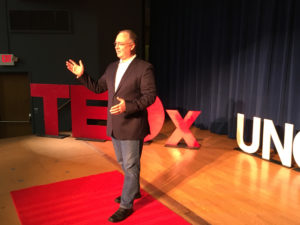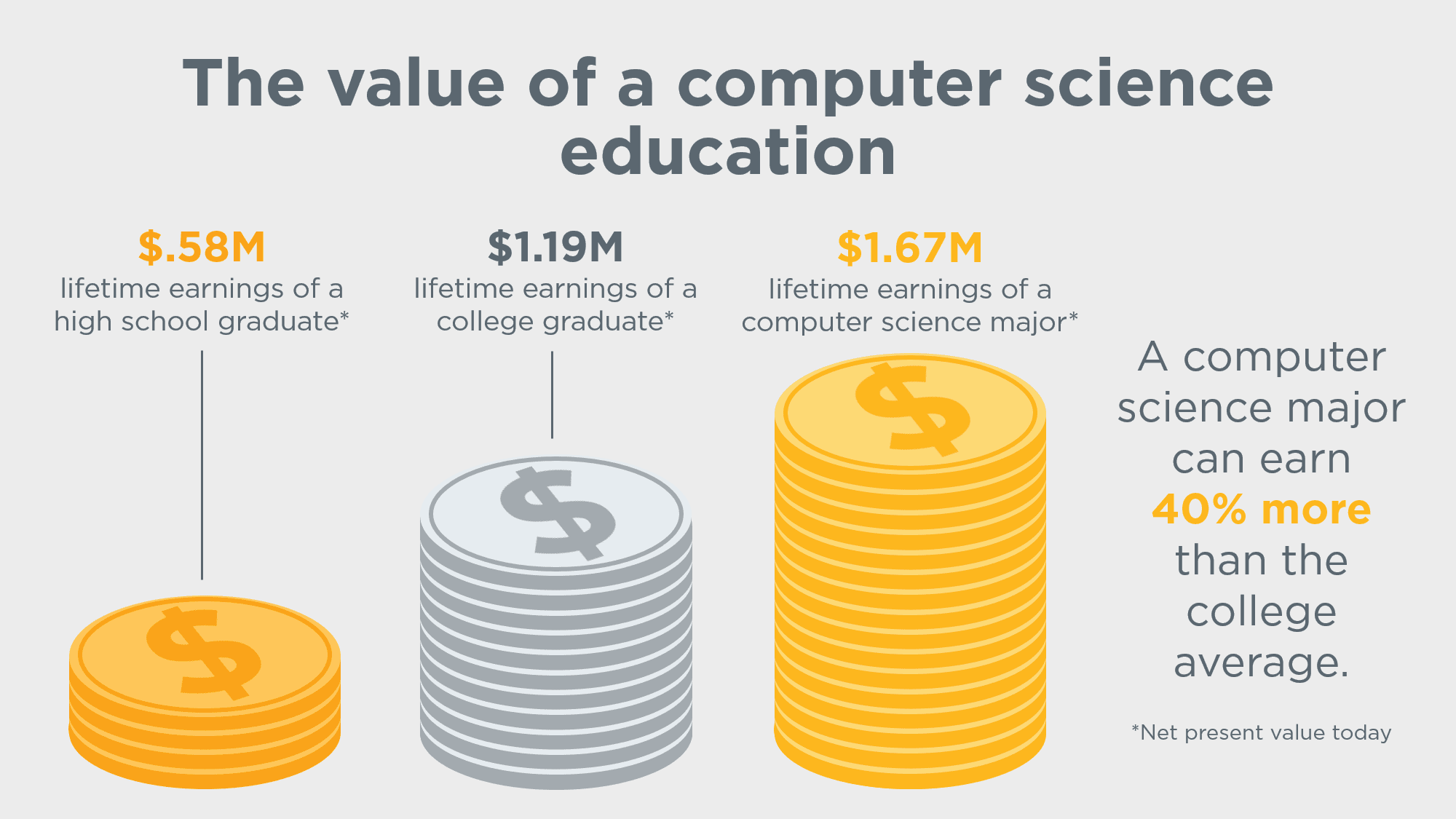
Dr. Payne speaks on Coding and Cyber as the New Literacy at TEDx 2018.
Imagine a world with a literacy rate of only 3%.
What if, out of every 100 people, only 3 could read and write?
Right now, in America, there are over 320 million people, yet fewer than 9 million of us, less than 3%, can read and write code – the language of technology.
So, what is code? Coding, or programming, is just telling a computer what to do – code is the same thing as software. Or, if you’re younger than 30, code is what apps are made of. Code is what runs a computer, and computers are everywhere today, in all the coolest gadgets, from 3D printers to drones, from self-driving cars to smartphones, fitbits to roomba’s and more. Software, code is a part of every piece of technology you’ll use at home and at work for the rest of your life.
Almost every job that you want, or that you want your kids to have, is touched by computer software – imagine the advantage you can have if you learn to speak the language of code.
As many as 70 million jobs could disappear in the next 10 years due to automation. On the other hand, there are over 6 million job openings unfilled in the US right now. Over a million of those are good-paying technology jobs, with no qualified applicants. No literate applicants.
And you don’t have to go very far to find these jobs – there are literally thousands of coding and cyber-related jobs right here in Atlanta.
Why are you so valuable if you’re a coder? Because we’re problem solvers who can use technology. Are there problems in the world? A few, right? The world needs problem solvers! Your goal in life should be to solve more problems than you create! Coding gives you the power to solve problems using technology, and the world highly rewards problem solvers…
You might have seen a graphic like this one, from code.org:

https://code.org/images/cs-stats/Slide5_CS_Education.png
A college graduate earns over half a million dollars more in a lifetime than a high-school graduate. A computer science graduate earns over a million dollars more than a high-school graduate. There’s another stack of gold coins that belongs to the right of this – a cybersecurity professional may be able to earn another half million more than the average IT worker.
And the gap is growing wider. That small stack of coins is a grim picture of what technology illiteracy can look like. But this chart is also an illustration of how important coding is to your future, to your children’s future.
In 1910, fewer than 18% of teenagers went to high school, and in 2010, fewer than 18% of teenagers went to a high school that taught coding.
It only took us 30 years to correct that first problem. As farming jobs disappeared in the early 1900’s, the US invested heavily in secondary education, and by 1940, 3/4 of teenagers went to high school. We need to do the same this century for technology education – by 2025, we need more than 3 out of 4 teenagers to go to a high school that teaches coding and cybersecurity.
As parents, as teachers, as citizens, we can’t wait until 2040.
I’m a computer science professor and a cybersecurity expert. I’ve been teaching coding since 1998. I write books, I record videos, I travel, I speak in high schools, elementary schools, middle schools, conferences. But it’s not enough. How many of you have taken a computer programming class? … see,there are some – that’s good, but it’s not enough. I need your help.
All of you. You can learn to code.
Henry Ford once said “Whether you think you can or think you can’t, you’re right.”
But, if you think you can’t code, you just haven’t tried yet. If you’re in this audience today, or if you’re watching online – you can learn to code starting now.
Some of you may already feel your defenses kicking in – what if I’m not good at it, what if I don’t like it? What if I just don’t want to be a coder for the next 20 years? My answer might surprise you…
Coding is not the goal. Coding is the gateway.
Coding is not the goal. Coding is the gateway.
In the same way we learn English not just to become authors or journalists, but to be able to communicate with others. And Math doesn’t just help us become accountants or engineers, it helps us solve problems, manage our finances, and make complex decisions.
People who learn to code can become entrepreneurs, innovators who create new platforms to connect people in new ways. You can become an animator, filmmaker, or you could be like two of my former students who’ve worked at both Riot Games and Blizzard Entertainment, building games like League of Legends and World of Warcraft. You can go into IT or cybersecurity, robotics, artificial intelligence or into any other job with extra skills, extra literacy, that can buffer you from some of the rapid changes that are coming.
My mom – and I am so lucky to have my mom here in the audience today! Thank you, mom – I love you – My mom bought me my first computer, a Commodore 64, in 1983 – I believe we have a picture – look how happy I am, and thinking about that computer still makes me smile 35 years later.
I started coding as a teenager, but I have a lot of students who take their first programming class as young adults. They didn’t know that instead of just playing Minecraft all these years, they could have been coding in it!
Let me give you three reasons to start coding now:
#1) Code for you.
It’s not just about the money, although you’ll make a lot… If you go on to learn about cybersecurity, you can protect yourself from cyber criminals and online predators. If you learn how to build web and mobile apps, you can create your own business model like Uber or AirBnB.
You can start by finding a technology that you enjoy. Go to a library and use a 3D printer to print something cool. Buy a programmable drone for under $100.
A lot of people like to start coding with a block-based programming language like Scratch or Blockly – this is the Tickle app, that uses a block-based programming language to tell drones and robots what to do.
The commands look like lego bricks – you pick the blocks that you want the drone to run, and the blocks snap together in the order you decide. When you’re the programmer, you get to choose how things work!
Let’s run this block of code on this actual drone and see what the code does…
Find the apps that are fun or fascinating to you, and try those things first. Even before you understand every line of code, run it, change it, move things around. Learn to code, for yourself first.
#2) Do it for others.
Bring value to your future employer, provide for your family, impact your community. When you learn to protect yourself online, you can better protect your kids and family members from online threats. You can build apps to help people in your hometown: One of my students this semester is building an app for the City of Dahlonega that allows residents to report problems like potholes in the road and street lights that are out. In addition to giving the exact GPS location of problems, it tracks when and how many people have reported an issue, and the problems that get reported by more people get higher priority in being repaired.
You can build a future for your family, and make your neighborhood a better, safer place – that’s the kind of lasting impact you can make when you learn to use technology to solve problems.
#3) Do it for the world.
Charity Water is a global clean water initiative that revolutionized transparency in both the dire need for clean water in poorer countries and in the ability to track where your donation is being used, down to the precise GPS coordinates of the drinking well you sponsor. A web application, code, is helping bring much-needed attention, and relief to people that need it the most.
At my house, my wife is able to track the remaining 3,800 tigers left in the wild through a similar app from an animal rescue organization. The thought of big cats becoming extinct before our kids grow up is heartbreaking to her. If there’s something that breaks your heart, or something that makes you really mad, coding can help you harness the power of technology to reach thousands or even millions of people who care about the same cause, and create a positive chain reaction to make people aware, and get them involved.
If you’re passionate about protecting your country, every branch of the US military now recognizes cyber as a domain equal to land, sea, air and space.
Today, billions of people go online every day, sharing skills and resources, creating new businesses, new charities, new games, new apps, new ways of seeing the world.
4 Billion of the world’s 7-1/2 Billion people have access to the Internet: spies and soldiers, terrorists and activists, hackers, doctors, musicians and bloggers are logging on every day, and it’s all possible because of code.
People say the world is changing – the world has already changed. Don’t get left behind. Step out of your comfort zone, and become literate in the language of technology.
Learn to code. What you do with it from there… is limitless.
Watch the full video of Dr. Payne’s TEDx Talk here: https://www.youtube.com/watch?v=IoEqyswsFvs






October 9, 2018 at 12:59 am
I like this video:
Code is NOT the goal, it’s the gateway!